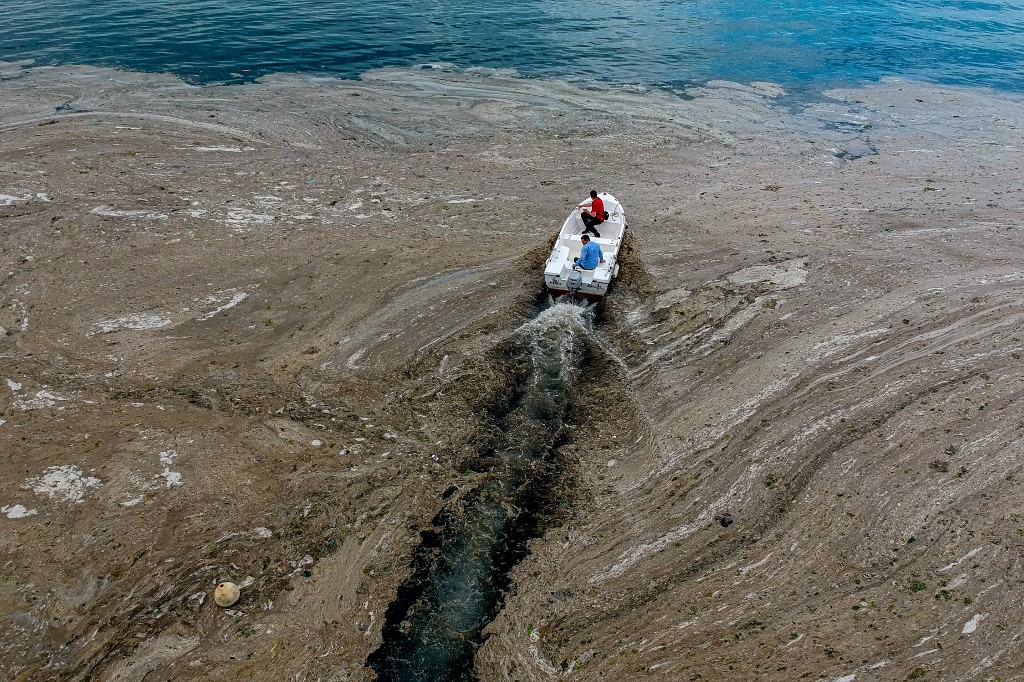Turkey and its neighbors pledged Friday to do a better job addressing the threats posed by pollution to people’s health and the natural habitats of the Mediterranean Sea, Agence France-Presse reported.
From plastic waste to slimy mucilage forming on their coasts, the ring of tourism-dependent Mediterranean countries have battled a steady stream of environmental problems, raising the issue’s importance in voters’ eyes.
Responding to the tide of public unease, envoys from 21 regional states agreed at a four-day gathering ending Friday on Turkey’s southern coast to slash the use of sulfur in fuel for ships.
Their decision to reduce the sulfur content of the fuel to 0.1 percent from 0.5 percent in the Mediterranean will be submitted to the International Maritime Organisation.
Once approved, the cap will come into force in January 2025.
“We expect that through the implementation of this decision, there will be an important reduction of pollution coming from ships,” said Tatjana Hema, coordinator of the Mediterranean Action Plan at the United Nations Environment Programme.
– ‘Breakthrough’ –
Mediterranean countries and the European Union hope the limit on sulfur use — the culmination of five years of talks that could provide a template for other deals — will ultimately save lives.
Besides hurting the sea, air pollution caused by smoke-chugging ships can be linked to 60,000 premature deaths a year globally, according to some expert estimates.
Hema told AFP any cut in sulfur would have positive “socioeconomic and health” effects by reducing hazardous emissions.
The EU led the effort to reduce sulfur content in fuel, said Patrick Child, deputy director-general for the environment at the European Commission.
“It’s one of the seas with the most challenging environmental biodiversity threats,” he said, calling the agreement on sulfur oxides a “breakthrough”.
But the list of increasingly urgent problems is long, putting pressure on regional governments.
The Mediterranean is “a hotspot for climate change”, said Carlos Bravo, an ocean policy expert who works for the Swiss-based OceanCare advocacy group.
Other issues include ships colliding with marine mammals, Bravo said since the sea is one of the densest for shipping traffic.
Action was also needed to eliminate “bycatch”, where turtles and sharks get trapped in commercial fishing nets, and to reduce noise pollution from ships, which affects more than 150 species, Bravo said.
– Cleaning ‘sea snot’ –
Turkey, which this year became the last G20 country to ratify the Paris climate agreement, has come under particularly heavy criticism for how it treats its water.
The issue gained international attention when a thick layer of slime dubbed “sea snot” covered İstanbul’s southern shores on the Sea of Marmara last summer.
Scientists blamed the mucus on Turkey’s failure to properly treat agricultural and industrial waste before it flows down rivers into the sea, whose unusual warmth creates ripe conditions for algae to grow out of control.
The sea snot has all been cleaned up, said Soner Olgun, laboratory, measurement and monitoring department chief at Turkey’s environment ministry, adding he did not “expect it to return this year or next year”.
Turkish officials now stress the imperative of eliminating all forms of waste — particularly plastics — to save the sea.
“It’s not just related to marine litter, but also related to wastewater treatment, as we saw in İstanbul with the mucilage,” Mehmet Emin Birpınar, Turkey’s deputy environment minister, told AFP.
Eighty percent of sea waste arrives from land, Birpınar said.
– Turtles eating plastic –
A Greek study in October said 3,760 tons of plastic waste were floating in the Mediterranean, whose littoral states stretch from North Africa to the Middle East and southwestern Europe.
One of the most poignant examples of the plastics’ harm comes from the famous but endangered loggerhead turtles, whose babies hatch on Turkey’s southern coast before crawling into the sea when they are ready.
They are carnivores but tend to confuse jellyfish for plastic bags, explained Yakup Kaska, head of the Sea Turtle Research, Rescue and Rehabilitation Centre based in Muğla, southwestern Turkey.
Kaska said rising sea temperatures also led to an increase in female turtles because heat determines the creatures’ sex.
“We are getting nearly 90 percent of the hatchlings who are females. We need males,” Kaska said.
“If one degree Celsius is the best scenario for the temperature increase, we may have all-female hatchlings in 50 or 100 years.”

